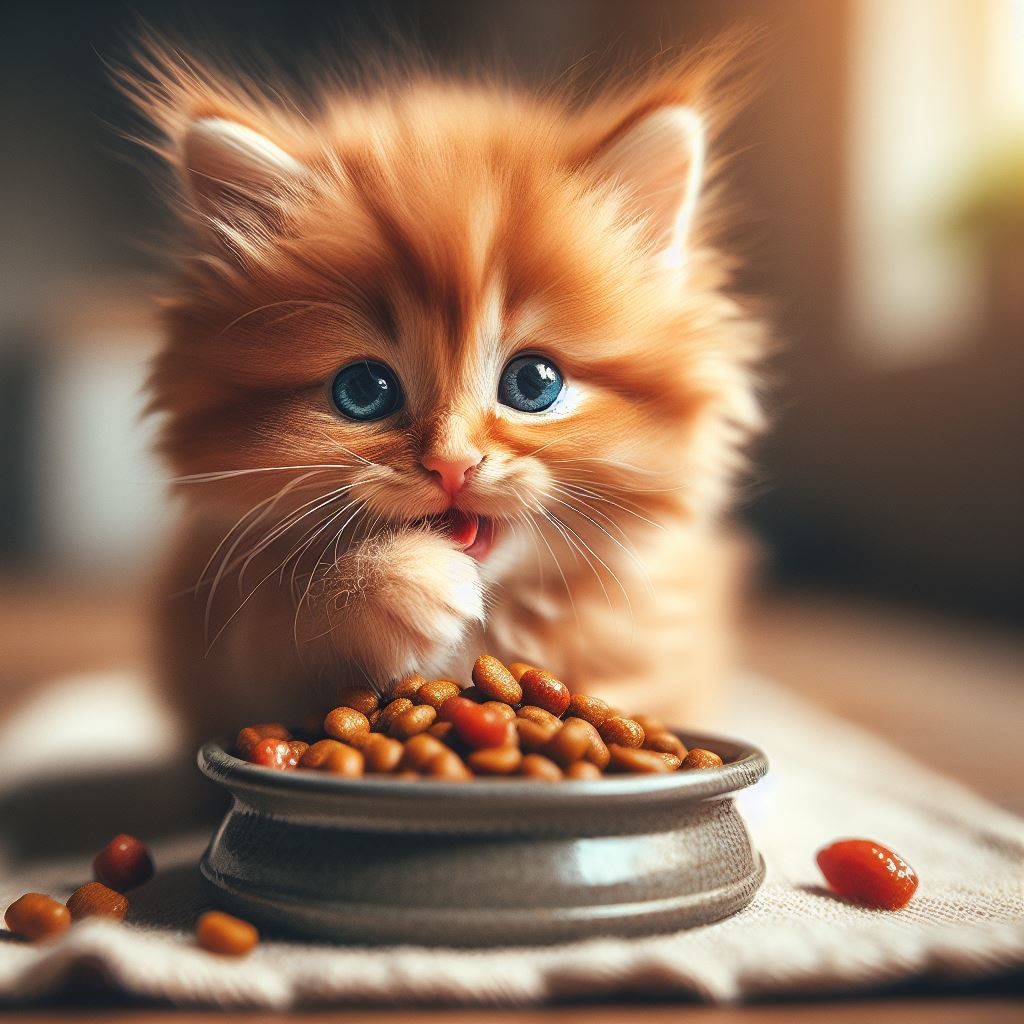Welcoming a new kitten into your home is an exciting and fun time. As a responsible pet parent, ensuring the health and well-being of your furry friend, is paramount. And one of the most important aspects of kitten care is nutrition. Just like human babies, kittens require specific nutrients to support their growth, development, and overall health. In this comprehensive guide, I’ll delve into the essentials of kitten nutrition and explore the best foods to keep your tiny companion happy and thriving.
Understanding Kitten Nutrition
Kittens are energetic, playful, and constantly growing, which means they have unique nutritional needs compared to adult cats. Providing your kitten with a balanced diet is essential for promoting healthy growth, strong bones, a robust immune system, and shiny fur. Protein is the cornerstone of a kitten’s diet, as it provides the essential amino acids necessary for muscle development and tissue repair. Look for high-quality animal-based proteins such as chicken, turkey, beef, and fish in your kitten’s food. Fat is another vital component of kitten nutrition, serving as a concentrated source of energy. Additionally, fats aid in the absorption of fat-soluble vitamins and contribute to healthy skin and coat. Opt for foods rich in omega-3 and omega-6 fatty acids, which support brain development and reduce inflammation. Carbohydrates supply kittens with the energy they need to fuel their playful antics. While cats are obligate carnivores and don’t require carbohydrates in large quantities, including a moderate amount of digestible carbs in your kitten’s diet can provide a readily available energy source. Vitamins and minerals play an important role in supporting various physiological functions, including bone health, immune function, and vision. Ensure your kitten’s food contains adequate levels of essential vitamins such as vitamin A, D, and E, as well as minerals like calcium, phosphorus, and magnesium.
Choosing the Right Kitten Food
When it comes to selecting the right food for your kitten, there are several factors to consider. Here are some guidelines to help you make an informed decision:
Age-appropriate nutrition
Choose a kitten-specific formula designed to meet the unique nutritional needs of young cats. These foods are formulated with higher levels of protein, fat, vitamins, and minerals to support growth and development.
 Read the labels
Read the labels
Look for kitten foods that list a high-quality protein source as the first ingredient. Avoid products that contain fillers, artificial preservatives, and additives. Additionally, ensure that the food meets the standards set by organizations such as the Association of American Feed Control Officials (AAFCO).
Wet vs. dry food
Both wet and dry kitten foods have their advantages. Wet food provides hydration and can be more palatable for picky eaters, while dry food offers convenience and helps maintain dental health. Many veterinarians recommend feeding a combination of both wet and dry food to provide variety and ensure balanced nutrition.
Gradual transition
If you need to switch your kitten’s food, do so gradually over the course of several days to avoid digestive upset. Mix a small amount of the new food with the old food and gradually increase the proportion of the new food while decreasing the old food.
Healthy Foods for Kittens…and now that I’ve covered the basics of kitten nutrition, let’s explore some healthy foods to incorporate into your kitten’s diet:
High-quality kitten kibble
Look for premium brands that use real meat as the primary ingredient and are free from artificial additives. Choose a formula specifically tailored to kittens to ensure optimal nutrition.

Did you find this article useful? Would you like 100% free access to more articles like these, and free access to over 5,000 vetted pet care service professionals throughout the United States? Sign up here for a free Petworks account, and take 10% off your first booking, on us!
Canned kitten food
Wet food provides essential moisture and can be especially beneficial for kittens who may not drink enough water. Opt for varieties that are high in protein and low in carbohydrates, with minimal fillers and additives.
Cooked chicken or turkey
Plain, cooked poultry is an excellent source of lean protein for kittens. Be sure to remove any bones and skin before feeding it to your furry friend.
Fish (in moderation)
While fish can be a tasty treat for kittens, it should be fed in moderation due to its high levels of mercury and potential for causing thiamine deficiency. Stick to small amounts of cooked, boneless fish such as salmon or tuna as an occasional treat.
Plain yogurt
Yogurt contains probiotics, which can help promote healthy digestion and support a robust immune system. Choose plain, unsweetened yogurt without any added flavors or sweeteners.
Cooked eggs
Eggs are a nutritious and protein-rich food that can be beneficial for kittens. Make sure to cook them thoroughly and serve them plain, without any seasonings or additives.
Fruits and vegetables
While cats are primarily carnivorous, small amounts of certain fruits and vegetables can be a healthy addition to their diet. Offer small pieces of cooked or raw vegetables such as carrots, green beans, or peas as occasional treats.
 Providing your kitten with a nutritious and balanced diet is essential for setting them up for a lifetime of health and happiness. By understanding the basics of kitten nutrition and selecting high-quality foods that meet their unique dietary needs, you can ensure that your furry friend grows into a strong, vibrant adult cat. Remember to consult with your mobile vet or a clinical cat nutritionist for personalized recommendations and guidance on feeding your kitten for optimal health. With the right diet and proper care, your kitten will thrive and bring you years of joy and companionship.
Providing your kitten with a nutritious and balanced diet is essential for setting them up for a lifetime of health and happiness. By understanding the basics of kitten nutrition and selecting high-quality foods that meet their unique dietary needs, you can ensure that your furry friend grows into a strong, vibrant adult cat. Remember to consult with your mobile vet or a clinical cat nutritionist for personalized recommendations and guidance on feeding your kitten for optimal health. With the right diet and proper care, your kitten will thrive and bring you years of joy and companionship.
About Petworks
 In 2021, Dr. Marty Goldstein DVM joined the pet care platform Petworks as an advisor in its Animal Nutrition care division. Dr Marty Nature’s Blend is on a mission to help your pets live their healthiest lives possible. Dr. Marty’s pet nutrition expertise and guidance has helped Petworks evolve and become the preeminent animal and pet nutrition consultation service for pet parents in North America.
In 2021, Dr. Marty Goldstein DVM joined the pet care platform Petworks as an advisor in its Animal Nutrition care division. Dr Marty Nature’s Blend is on a mission to help your pets live their healthiest lives possible. Dr. Marty’s pet nutrition expertise and guidance has helped Petworks evolve and become the preeminent animal and pet nutrition consultation service for pet parents in North America.
 In 2022, Blue Buffalo Founder Bill Bishop Jr. joined Petworks as Senior Advisor in our Animal Nutrition Care Division. Bill brings his extensive expertise in pet food innovation and business leadership. His guidance helps Petworks enhance our pet nutrition service offerings, helping to ensure that pet parents throughout the world receive trusted, science-backed nutritional support for their dogs, cats, and animals.
In 2022, Blue Buffalo Founder Bill Bishop Jr. joined Petworks as Senior Advisor in our Animal Nutrition Care Division. Bill brings his extensive expertise in pet food innovation and business leadership. His guidance helps Petworks enhance our pet nutrition service offerings, helping to ensure that pet parents throughout the world receive trusted, science-backed nutritional support for their dogs, cats, and animals.
About The Author
Petworks Co-Founder Kevin Kinyon is a life-long animal lover who works tirelessly to improve the lives of pets and their parents. Human and animal qualities he values most are integrity, humor, and empathy.




Thanks for sharing. I read many of your blog posts, cool, your blog is very good.
Very good website Petworks. Beats Purina and Mars all day long.
Love this for my new kittens!
Thanks for your article about kitten food and health.